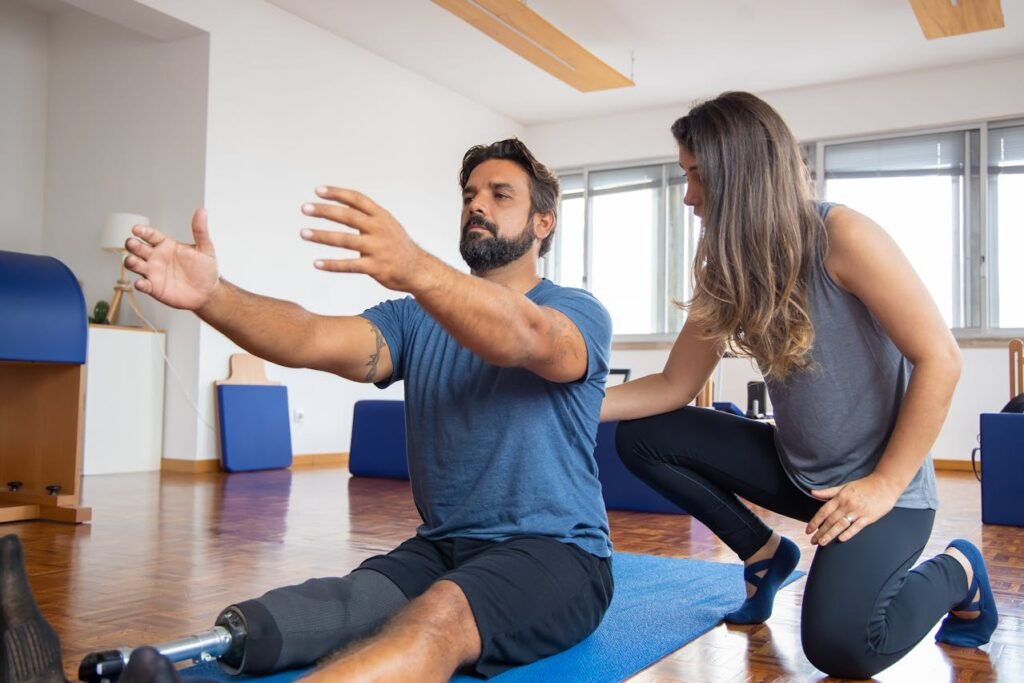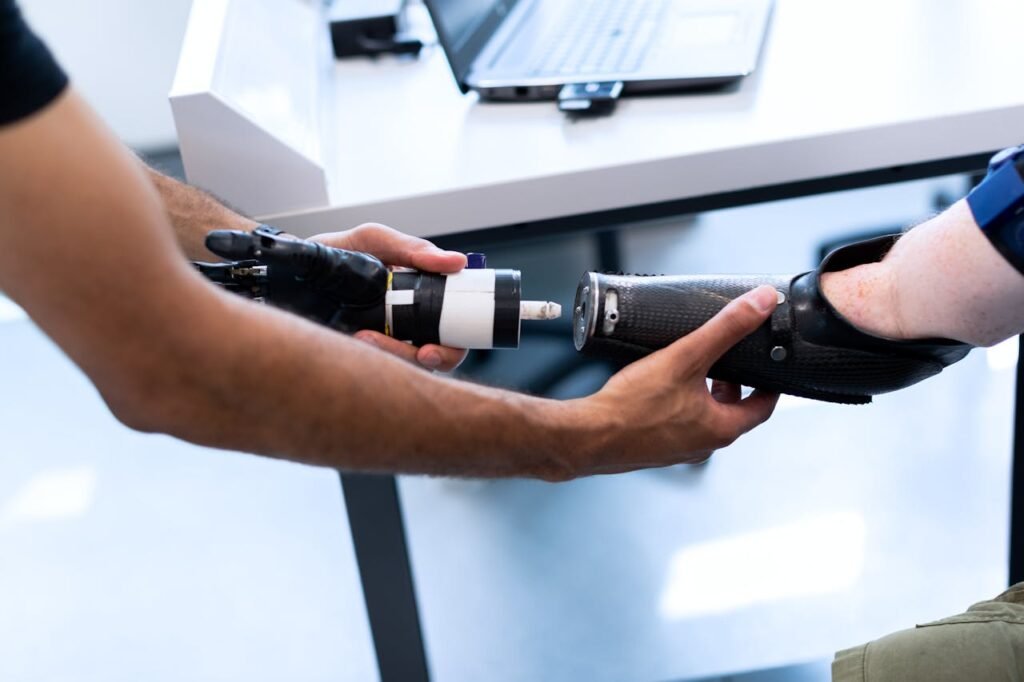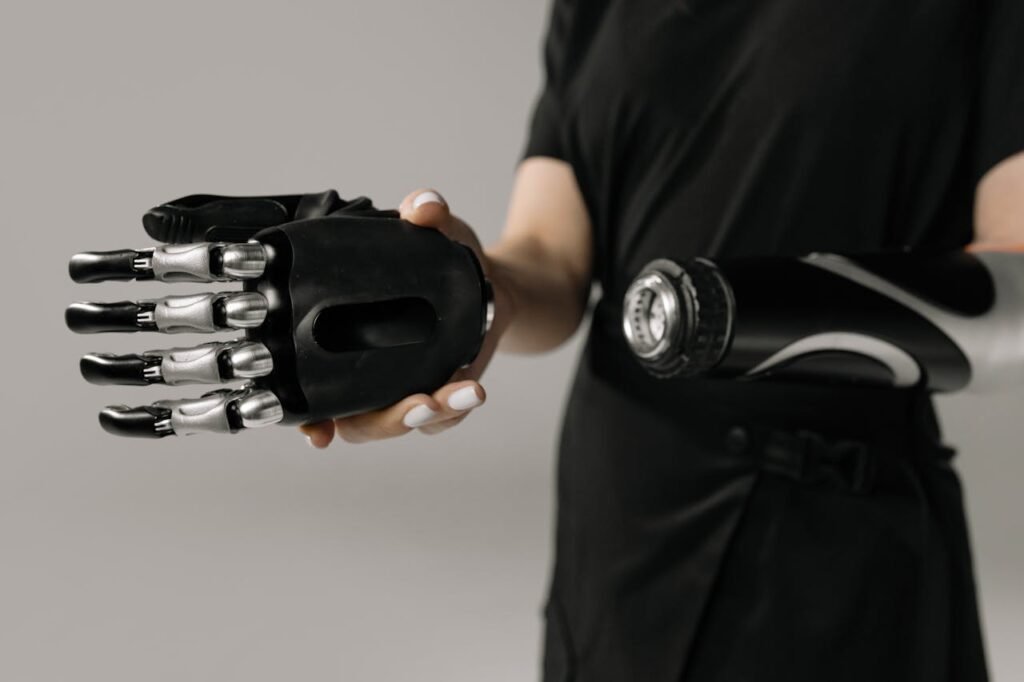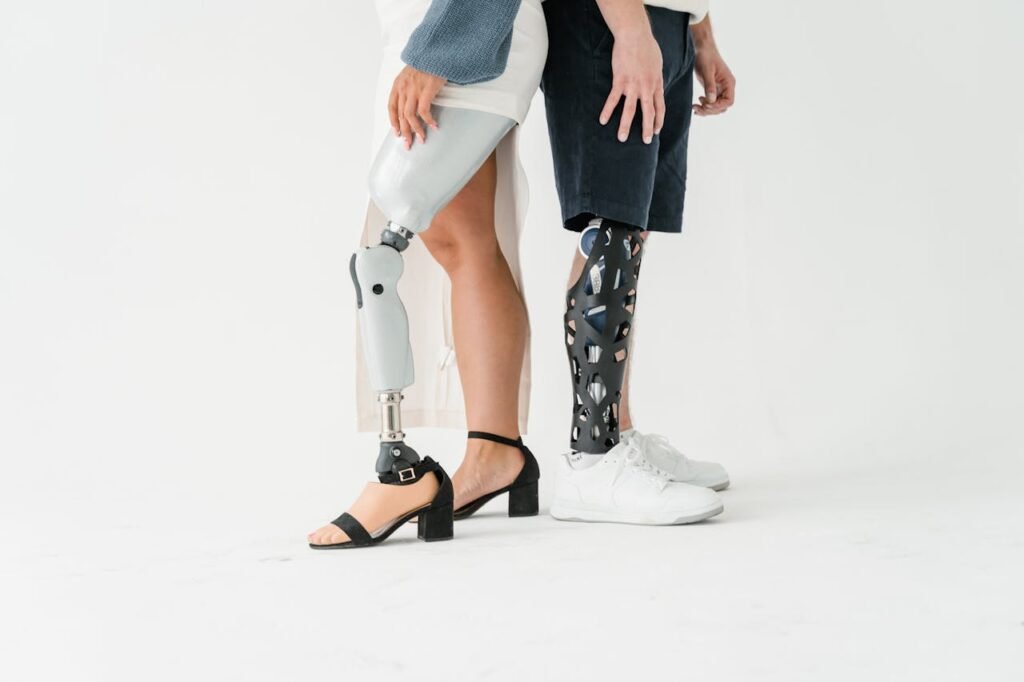When someone loses a limb, the first few weeks feel confusing. Simple things become hard. You may wonder where to turn, who to trust, and how long recovery will take.
But in cities like Chandigarh and Mohali, getting fitted with the right prosthetic—and getting fast help when something goes wrong—is now easier than ever.
This guide is your clear, step-by-step look at where to go, what to expect, and how to get the best care for prosthetic fittings and repairs in the Chandigarh–Mohali region.
Let’s begin.
Getting Fitted for a Prosthetic in Chandigarh–Mohali
Why a Proper Fit Changes Everything

A prosthetic that fits well can change your life. It helps you move better, feel more comfortable, and get back to doing the things you love.
But when the fit is off—when it’s too loose, too tight, or just uncomfortable—everyday life becomes a struggle.
That’s why your first fitting is one of the most important steps in your journey.
In Chandigarh and Mohali, there are now several modern centers where you can get a proper, personalized fit.
What Happens During a Fitting
When you walk into a clinic, the process usually starts with a conversation. The prosthetist wants to know how you lost your limb, what your day-to-day life looks like, and what kind of help you’re looking for.
Then they’ll take a close look at your residual limb. They check skin condition, sensitivity, bone structure, and muscle signals—especially if you’re considering a myoelectric device like the Grippy™ Bionic Hand.
Next comes measurement. Some clinics still use plaster molds to shape the socket. But newer centers in Chandigarh use 3D scanning for higher accuracy. It’s faster, cleaner, and more precise.
This socket is the part that connects your limb to the prosthetic. If this part isn’t done right, nothing else will feel right.
Once your socket is made, you’ll get a test fit. You wear it, walk or move with it, and give feedback. Adjustments are made based on how it feels in real life.
Only after this trial does the clinic move forward with the final device.
Choosing the Right Type of Prosthetic
In Chandigarh–Mohali, you’ll find many types of prosthetics. Some are simple, while others are advanced.
If you’ve lost a leg, you may get a below-knee or above-knee prosthetic. If it’s a hand or arm, your options may include mechanical, cosmetic, or bionic limbs.
Cosmetic limbs are made to look natural. They don’t move but help with appearance.
Mechanical limbs use body power, like cables or straps. These are more functional but less advanced.
Then there are bionic limbs like Grippy™. These respond to your muscle signals and let you open and close your hand naturally. Some even let you change grip styles.
A trained prosthetist will help you choose the best fit for your lifestyle and budget.
Clinics That Focus on Fast and Accurate Fittings
In Chandigarh and Mohali, speed and accuracy matter. The best clinics now offer quick turnaround without cutting corners.
Some centers finish the entire process—from consultation to delivery—in under two weeks. Others offer express services for people who travel from nearby towns like Panchkula, Zirakpur, or Kharar.
Robobionics partners with select clinics that meet strict standards for care, precision, and follow-up support.
These clinics offer trial fittings, clear pricing, and aftercare, so you’re never left confused or waiting.
If you want to try a bionic hand like Grippy™, these clinics are trained to help you test it first—before you commit.
You can book a demo anytime here:
https://www.robobionics.in/bookdemo
What to Ask Before You Get Fitted
Before choosing a clinic, ask a few questions to make sure you’re in the right hands:
Do you have experience with my type of limb loss?
Can I try the prosthetic before I pay?
What kind of training will I get after fitting?
What happens if the fit doesn’t feel right later?
Will you help me with repairs and follow-ups?
These questions will help you choose a place that supports you from start to finish.
How Long Does the Fitting Process Take?
On average, it takes about 7 to 15 days to complete the full process—from your first visit to receiving your final prosthetic.
The time depends on the type of device, your limb’s condition, and how many adjustments are needed.
If you need a fast service, some clinics offer a 3-to-5-day option with a focused team working on just your case.
Keep in mind, though, that a little extra time spent now can save you months of pain or repairs later.
Getting Your Prosthetic Repaired Fast in Chandigarh–Mohali
Why Repairs Matter More Than You Think

A prosthetic isn’t just a tool. It becomes part of your body. You rely on it to walk, cook, drive, write, and hug the people you love.
So when it breaks—or even when it feels slightly off—it can throw your whole life out of balance.
That’s why fast, reliable repair services are just as important as the initial fitting.
In Chandigarh and Mohali, repair support for prosthetics has improved a lot in recent years. But not all clinics or technicians offer the same level of service.
Knowing where to go, what to expect, and how to act quickly can make a huge difference.
Common Reasons You Might Need a Repair
Prosthetic limbs—especially bionic ones—are made of many small parts. Over time, some of these parts may wear out or need realignment.
If you’re using a mechanical limb, you might face issues like a loose joint, a broken strap, or a worn-out socket.
For bionic devices, common problems include weak battery life, slow motor response, or faulty sensors.
Some users notice sudden discomfort, rubbing, or clicking sounds. Others feel their limb is harder to control than before.
It’s easy to ignore these signs, but it’s better to act early. Small problems can turn into big ones if left unchecked.
How Fast Repairs Work in Chandigarh and Mohali
Many users worry that repairs will take weeks, especially for advanced limbs. But in most cases, the solution is quicker than you expect.
For simple repairs like screw tightening, socket adjustment, or strap replacement, most clinics can fix things the same day.
More complex issues—like motor replacement in a bionic hand or socket remolding—may take two to three days. If parts need to be ordered, it could take a bit longer.
That’s why it helps to go to a center that has spare parts in stock and trained technicians on-site.
Some clinics in Chandigarh now keep full-service labs in-house. That means you don’t have to send your prosthetic elsewhere and wait for weeks.
Robobionics-certified clinics follow this model. They’re equipped to handle common Grippy™ issues quickly—whether it’s a touch sensor replacement, grip recalibration, or full socket remake.
And in case of urgent needs, they even offer pickup and drop-off services.
What to Expect When You Bring in a Damaged Prosthetic
When you walk in for a repair, the clinic team will first examine the prosthetic thoroughly.
They’ll check the joint movement, connection points, battery strength (if it’s a bionic device), and how well the socket fits.
Next, they’ll listen to your feedback—what feels wrong, when it started, and how it’s affecting your daily life.
You’ll usually get a repair quote on the spot. For minor fixes, they might not charge anything—especially if the device is under warranty.
In the case of bionic hands, the clinic may also run a signal test to make sure your muscle control is working fine. If there’s a drop in response, the issue could be with the sensors rather than the hand itself.
Whatever the cause, clear communication makes the repair process smoother.
Keeping Spare Parts Available
A big challenge in prosthetic repairs across India has been spare part delays. Many imported limbs take weeks or months to service because the parts come from overseas.
But Robobionics solved this by making over 90% of Grippy’s components in India. That means quicker part access, cheaper replacements, and zero customs delays.
Our Chandigarh–Mohali partners carry all essential spares—grip pads, sensors, motors, straps, batteries—so users aren’t left waiting.
Even better, trained technicians on-site mean you don’t have to mail the device away or sit without it for long.
Some repairs can even be completed while you have tea in the waiting room.
Emergency Support for Working Professionals and Students
When a prosthetic stops working, life doesn’t stop. You still have a job to go to, classes to attend, chores to handle.
We understand how stressful that can be—especially for working users or students who depend on their limb every day.
That’s why some of our partner clinics in Chandigarh offer express repair windows. These are same-day or 24-hour repair slots for urgent cases.
You can call ahead, explain your issue, and book a repair slot that fits your schedule.
And if you can’t come in, mobile service teams can sometimes visit your home or workplace for quick fixes.
Tips to Avoid Common Repairs
While repairs are normal over time, there are a few things you can do to reduce how often you need them.
Clean your prosthetic every day—especially the socket and straps. Sweat and dust can affect grip and cause discomfort.
Charge your bionic device fully every night. This keeps the motor running smoothly and avoids sudden shutdowns.
Avoid using your prosthetic in water or in heavy dust unless it’s designed for those conditions. If you’re not sure, ask your prosthetist.
And always go for a check-up if something feels even slightly off. Early care is always easier and cheaper than major repairs.
How Much Do Repairs Cost?
The cost depends on the type of prosthetic and the kind of issue. For basic mechanical limbs, minor repairs might cost between ₹500 and ₹2,000.
For bionic limbs, part replacements could cost ₹2,000 to ₹10,000 or more, depending on whether it’s a sensor, motor, or full socket redo.
That said, many issues are covered under warranty—especially if your limb is less than a year old.
Robobionics offers a standard warranty on Grippy™ and extended coverage through service plans. We also help users plan maintenance so they don’t face sudden repair shocks.
Choosing the Right Prosthetic Center in Chandigarh–Mohali
Why Choosing the Right Center Matters

Getting a prosthetic isn’t a one-time visit. It’s a journey—one that starts with fitting but continues with training, adjustments, repairs, and emotional support.
That’s why choosing the right clinic is so important. You’re not just picking a product—you’re choosing a team that will stand beside you.
In Chandigarh–Mohali, there are several clinics that offer prosthetic services. But not all clinics are the same. Some have great tools but poor follow-up. Others are kind and helpful but lack the technology for modern devices.
So how do you choose? Start by asking the right questions.
What to Look for in a Good Clinic
A reliable prosthetic center will always begin with a detailed consultation. They won’t rush you or push you into buying something quickly.
They’ll listen carefully, ask about your lifestyle, and explain your options clearly—whether it’s a basic mechanical limb or a bionic device like Grippy™.
You should feel respected, informed, and supported from the first meeting itself.
A good clinic will have trained prosthetists, certified technicians, and access to advanced tools like 3D scanning or EMG testing (used for myoelectric limbs).
They’ll also have a dedicated space for rehab or training. Because learning to use your prosthetic is just as important as getting it fitted right.
Checking for Certifications and Experience
Always ask about the clinic’s background. Are they certified by any medical board or prosthetic association? Do they have experience with your specific type of limb loss—upper or lower, above or below the joint?
Some centers in Chandigarh–Mohali specialize only in leg prosthetics. Others focus on children. Make sure your needs match their experience.
Also, look for real-world results. Ask if they have past users who are open to sharing their experience. It helps to hear from someone who’s already been through the process.
Robobionics works only with selected partner clinics that meet strict care standards. These clinics go through training and offer access to Grippy™ and other Robobionics products, along with proper fitting and repair protocols.
Don’t Forget Aftercare and Support
Too many users get a prosthetic, go home—and then feel completely lost.
A good clinic will not let that happen. They’ll check in with you regularly, invite you for adjustments, and guide you through daily use challenges.
They’ll offer phone or video support when needed and keep your records up to date. If something breaks, they’ll help you fix it quickly.
Some of the best clinics in Chandigarh–Mohali even offer group support sessions or connect new users with experienced ones for peer guidance.
That kind of emotional and practical support makes a big difference in how well you adapt.
Location and Accessibility
Think about how easy it is to reach the clinic. Is it close to home? Can you visit easily by car, bike, or public transport?
Prosthetic fittings often need multiple visits, especially in the beginning. If the clinic is far, or hard to reach, it might become a burden.
Also, ask if the clinic offers mobile support or home visits. Some Robobionics partners in Mohali now offer at-home trials and doorstep repairs—especially for seniors or users with mobility challenges.
That kind of convenience can be a game-changer.
What to Avoid
Not all clinics offer the same quality of care. Be cautious if:
The clinic doesn’t explain your options clearly
They demand full payment before trial
They avoid giving you a written quote
There’s no follow-up system or contact person
The staff seems rushed or uninterested in your story
A clinic that doesn’t listen won’t serve you well—no matter how modern their equipment looks.
Trust your gut. If something feels off, it probably is.
How Robobionics Is Helping Users in Chandigarh–Mohali and Beyond
Designed for India, Built for You

Robobionics began with one simple idea—high-quality prosthetics should not be a luxury. Everyone, no matter their background or income, deserves a chance to live fully after limb loss.
That’s why we created Grippy™, a lightweight, sensor-driven bionic hand that works using your body’s natural muscle signals. It’s smart, responsive, and made with Indian users in mind.
The Grippy™ system is durable enough for daily life in Indian cities and towns, light enough for kids and seniors, and responsive enough to handle tasks like writing, cooking, using a phone, or even playing a musical instrument.
More importantly, it’s priced affordably—starting at ₹2.15 lakh—compared to imported bionic limbs that often cost ₹10 lakh or more.
Over 90% of the Grippy™ is made in India. That means fast service, easy access to spare parts, and the kind of customization that global brands simply can’t offer here.
Local Partnerships That Make Life Easier
In Chandigarh–Mohali, Robobionics partners with certified, trusted clinics that understand the importance of good care.
These clinics have been trained to fit, calibrate, and support Grippy™ devices properly. They use best-in-class equipment, follow clean and safe processes, and take the time to explain everything in plain language.
Whether you’re a student in Sector 15, a retired army officer in Zirakpur, or a teacher in Kharar—our partners are never too far. And they’re ready to walk the journey with you, from consultation to first grip and beyond.
We also support mobile fitment units, home demo visits, and video consultations for users who can’t travel easily. Our goal is to remove every barrier—physical, financial, or emotional.
Payment Help That Actually Helps
Let’s be honest. Most people can’t afford to pay a few lakh rupees in one go. And that’s okay.
That’s why Robobionics offers flexible EMI plans through our partner clinics. With proper documents, you can get started with a small down payment and manageable monthly installments.
We also guide users through insurance paperwork, reimbursement processes, and NGO support options if available.
We’ve even worked with CSR teams and donors to sponsor prosthetics for people who couldn’t afford them otherwise. Because we believe money should never stop someone from living again.
And once you’re part of the Robobionics community, we continue to support you—whether it’s with repairs, upgrades, or just checking in to see how you’re doing.
Real People, Real Results
In Chandigarh, we’ve seen lives transformed. A 19-year-old engineering student who lost his hand in a bus accident now types on a laptop using Grippy™. A grandmother who hadn’t cooked in three years is back in the kitchen, making aloo parathas with confidence.
A schoolteacher in Mohali now holds chalk and writes on the board—something she thought she’d never do again.
These aren’t dramatic, made-up stories. These are everyday people—just like you—who found their strength again with a little help, the right technology, and a team that truly cared.
Robobionics didn’t just sell them a hand. We gave them back their independence.
How You Can Get Started Today
If you’ve read this far, you’re probably ready to take a step. Maybe it’s for yourself, maybe it’s for someone you love. Either way, know this—you don’t need to do it alone.
We’re here to answer every question, calm every doubt, and guide you at every step.
You don’t need to understand how bionic hands work. You don’t need to know what parts go inside. You just need to show up. Let us handle the rest.
You can book a free consultation or product demo with us here:
https://www.robobionics.in/bookdemo
One of our experts will connect with you, help you choose the right clinic nearby, and plan everything at your pace.
No pressure. No sales talk. Just a conversation with someone who genuinely wants to help.
Final Words of Hope

Losing a limb doesn’t mean losing your place in the world. It just means finding a new way to move through it.
With the right prosthetic, the right clinic, and the right support, you can write again, cook again, play again, and smile again—not just for others, but for yourself.
At Robobionics, we’ve seen thousands of users rediscover what they thought they had lost forever.
You can be next.
Book your free demo or consultation today:
https://www.robobionics.in/bookdemo
We’re here to help you take your next step—literally and emotionally—with care, dignity, and innovation that puts you first.



